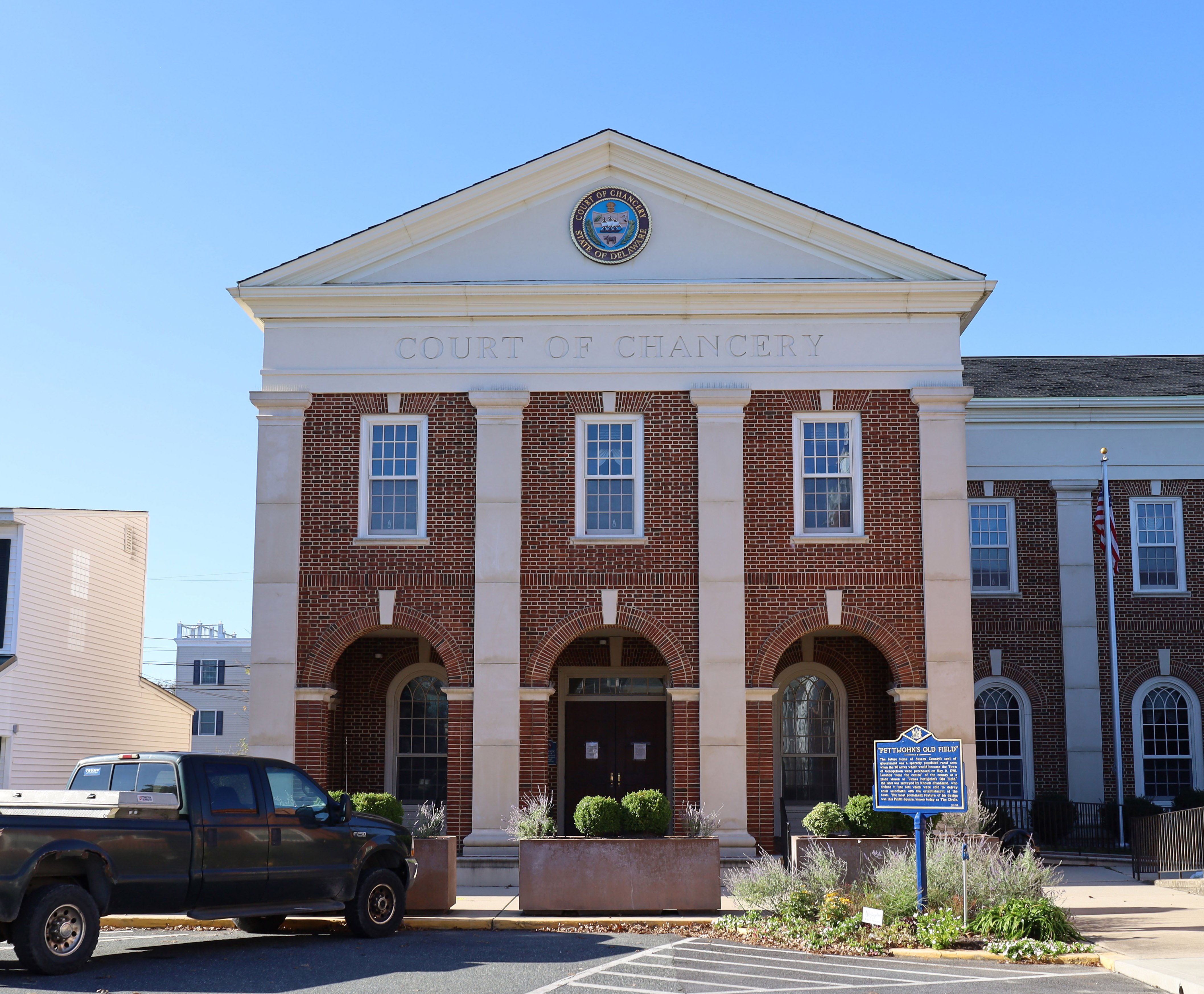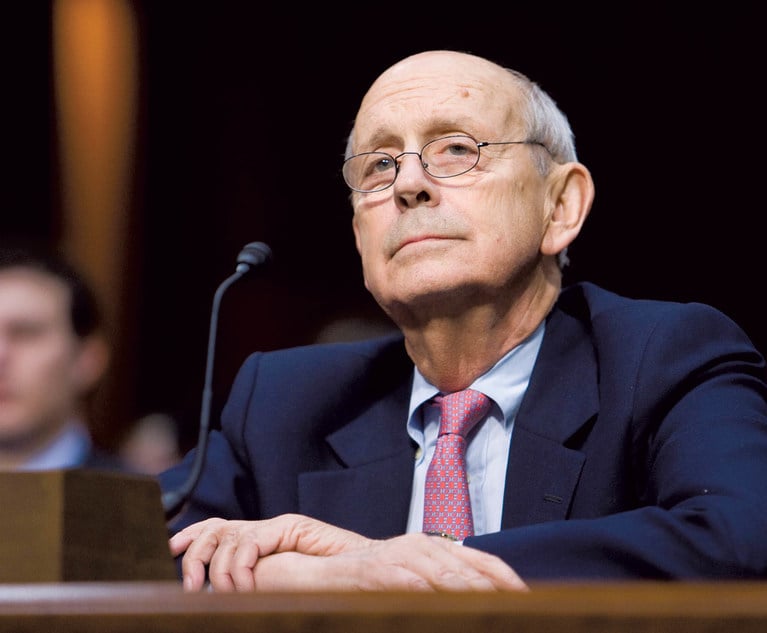Schnatter Takes Fight to Papa John's Board in Suit to Pry Open Records
Attorneys in a multifaceted battle for control of Papa John's are set to square off in a Wilmington courtroom Thursday afternoon, as company founder and former CEO John Schnatter tries to maintain a books-and-records case seeking records related to his ouster from the pizza chain.
September 17, 2018 at 06:40 PM
5 minute read
 John Schnatter, Papa John's founder ,arrives at the 2012 Academy of Country Music Awards at MGM Grand Garden Arena on April 1, 2012 in Las Vegas. Photo Credit: Kathy Hutchins/Shutterstock
John Schnatter, Papa John's founder ,arrives at the 2012 Academy of Country Music Awards at MGM Grand Garden Arena on April 1, 2012 in Las Vegas. Photo Credit: Kathy Hutchins/Shutterstock
Attorneys in a multifaceted battle for control of Papa John's are set to square off in a Wilmington courtroom Thursday afternoon, as company founder and former CEO John Schnatter tries to maintain a books-and-records case seeking records related to his ouster from the pizza chain.
However, those efforts could be complicated by Schnatter's decision in August to lodge a separate derivative suit in the Delaware Court of Chancery accusing the Papa John's directors of breaching their duties to shareholders in the wake of Schnatter's exit as company chairman, which followed reports that he had used a racial slur during a company training session in May.
Papa John's team from Richards, Layton & Finger last week said the two lawsuits allege the same underlying wrongdoing, and cast the July books-and-records case as a broad and misguided attempt at retaliation against the company. Instead, they argued, the embattled former executive should be forced to obtain board materials through discovery in the derivative litigation.
“Under Delaware law, the filing of a plenary suit destroys the purpose of seeking documents to investigate mismanagement,” Richards Layton director Blake Rohrbacher wrote Sept. 11 in a motion to dismiss.
Schnatter, who is still a director of the company, meanwhile has signaled that he is preparing for a fight. He has hired high-powered trial lawyer Patricia Glaser to represent him in both cases, and told the company back in July that he planned to fight his removal.
Glaser, a partner and litigation chair with Glaser Weil Fink Howard Avchen & Shapiro in Los Angeles, recently represented Harvey Weinstein in negotiations with The Weinstein Co., after the studio terminated the disgraced movie producer amid scores of sexual misconduct allegations.
In a court filing last week, Schnatter's attorneys said Papa John's was “lacking meritorious defenses” in the books-and-records case, and hit the company for a “contrived motion to dismiss based on mischaracterizations of a separate and distinct derivative action.”
In Delaware, they argued, directors are allowed “virtually unfettered” access to corporate documents, and the company faced a heavy burden for proving that Schnatter was not entitled to books and records.
Schnatter's team also differentiated the two suits, saying that the books-and-records case sought information leading up to a July 15 board meeting, where directors accepted a special committee's recommendation that the company cancel two contracts related to Schnatter's employment. The five-count derivative action, on the other hand, alleged corporate wrongdoing that supposedly occurred after Schnatter's initial demand for documents on July 25, the attorneys said.
“With its motion, the company has, again, demonstrated that there is no degree of obstructionism too low for it to engage in with regard to Mr. Schnatter,” Brett M. McCartney, director of the Bayard PA law firm in Wilmington, wrote.
“The carefully crafted plenary action Mr. Schnatter filed does not justify dismissal of his books-and-records action where plaintiff seeks documents necessary to inform himself as a director,” McCartney said in the filing.
Schnatter filed the books-and-records suit July 26, after he said Papa John's had failed to produce documents relevant to his demand.
On Aug. 30, Schnatter filed his derivative case under seal, accusing the rest of the Papa John's directors of breaching their duty of loyalty to investors. The 30-page complaint, made public on Sept. 5, specifically targets current CEO Steve Ritchie, whom Schnatter accused of lying in order to keep his own job with the company. And it included vague allegations of “sexual harassment or other misconduct” by members of Ritchie's senior leadership team.
Both cases have been assigned to Chancery Court Chancellor Andre G. Bouchard.
In an emailed statement, Papa John's said Schnatter's allegations were “entirely without merit” and vowed to defend the “baseless” claims in court.
“John Schnatter will do anything to distract attention from the harm caused by his inappropriate words,” the company said on Sept. 7. “He continues to make reckless allegations in his attempt to regain control and serve his own interests.”
Schnatter, who owns a 30 percent stake in Papa John's, resigned as CEO last December in the wake of controversial comments he made regarding a widely publicized dispute over players in the National Football League refusing to stand for the national anthem.
Schnatter stepped down as chairman of the Papa John's board in July, after Forbes published an article on its website claiming that he had used a racial slur during a diversity media training exercise. He has apologized and admitted to making the remark, though he said it was taken out of context.
This content has been archived. It is available through our partners, LexisNexis® and Bloomberg Law.
To view this content, please continue to their sites.
Not a Lexis Subscriber?
Subscribe Now
Not a Bloomberg Law Subscriber?
Subscribe Now
NOT FOR REPRINT
© 2025 ALM Global, LLC, All Rights Reserved. Request academic re-use from www.copyright.com. All other uses, submit a request to [email protected]. For more information visit Asset & Logo Licensing.
You Might Like
View All
Beyond Meat Faces Shareholder Suit Over Ability to Produce Product at Scale

New Derivative Suit Says Kraft Heinz Shareholders Were Misled on Post-Merger Losses
3 minute read
Supreme Court Will Again Be Focus of IP World in 2023
Trending Stories
Who Got The Work
Michael G. Bongiorno, Andrew Scott Dulberg and Elizabeth E. Driscoll from Wilmer Cutler Pickering Hale and Dorr have stepped in to represent Symbotic Inc., an A.I.-enabled technology platform that focuses on increasing supply chain efficiency, and other defendants in a pending shareholder derivative lawsuit. The case, filed Oct. 2 in Massachusetts District Court by the Brown Law Firm on behalf of Stephen Austen, accuses certain officers and directors of misleading investors in regard to Symbotic's potential for margin growth by failing to disclose that the company was not equipped to timely deploy its systems or manage expenses through project delays. The case, assigned to U.S. District Judge Nathaniel M. Gorton, is 1:24-cv-12522, Austen v. Cohen et al.
Who Got The Work
Edmund Polubinski and Marie Killmond of Davis Polk & Wardwell have entered appearances for data platform software development company MongoDB and other defendants in a pending shareholder derivative lawsuit. The action, filed Oct. 7 in New York Southern District Court by the Brown Law Firm, accuses the company's directors and/or officers of falsely expressing confidence in the company’s restructuring of its sales incentive plan and downplaying the severity of decreases in its upfront commitments. The case is 1:24-cv-07594, Roy v. Ittycheria et al.
Who Got The Work
Amy O. Bruchs and Kurt F. Ellison of Michael Best & Friedrich have entered appearances for Epic Systems Corp. in a pending employment discrimination lawsuit. The suit was filed Sept. 7 in Wisconsin Western District Court by Levine Eisberner LLC and Siri & Glimstad on behalf of a project manager who claims that he was wrongfully terminated after applying for a religious exemption to the defendant's COVID-19 vaccine mandate. The case, assigned to U.S. Magistrate Judge Anita Marie Boor, is 3:24-cv-00630, Secker, Nathan v. Epic Systems Corporation.
Who Got The Work
David X. Sullivan, Thomas J. Finn and Gregory A. Hall from McCarter & English have entered appearances for Sunrun Installation Services in a pending civil rights lawsuit. The complaint was filed Sept. 4 in Connecticut District Court by attorney Robert M. Berke on behalf of former employee George Edward Steins, who was arrested and charged with employing an unregistered home improvement salesperson. The complaint alleges that had Sunrun informed the Connecticut Department of Consumer Protection that the plaintiff's employment had ended in 2017 and that he no longer held Sunrun's home improvement contractor license, he would not have been hit with charges, which were dismissed in May 2024. The case, assigned to U.S. District Judge Jeffrey A. Meyer, is 3:24-cv-01423, Steins v. Sunrun, Inc. et al.
Who Got The Work
Greenberg Traurig shareholder Joshua L. Raskin has entered an appearance for boohoo.com UK Ltd. in a pending patent infringement lawsuit. The suit, filed Sept. 3 in Texas Eastern District Court by Rozier Hardt McDonough on behalf of Alto Dynamics, asserts five patents related to an online shopping platform. The case, assigned to U.S. District Judge Rodney Gilstrap, is 2:24-cv-00719, Alto Dynamics, LLC v. boohoo.com UK Limited.
Featured Firms
Law Offices of Gary Martin Hays & Associates, P.C.
(470) 294-1674
Law Offices of Mark E. Salomone
(857) 444-6468
Smith & Hassler
(713) 739-1250







